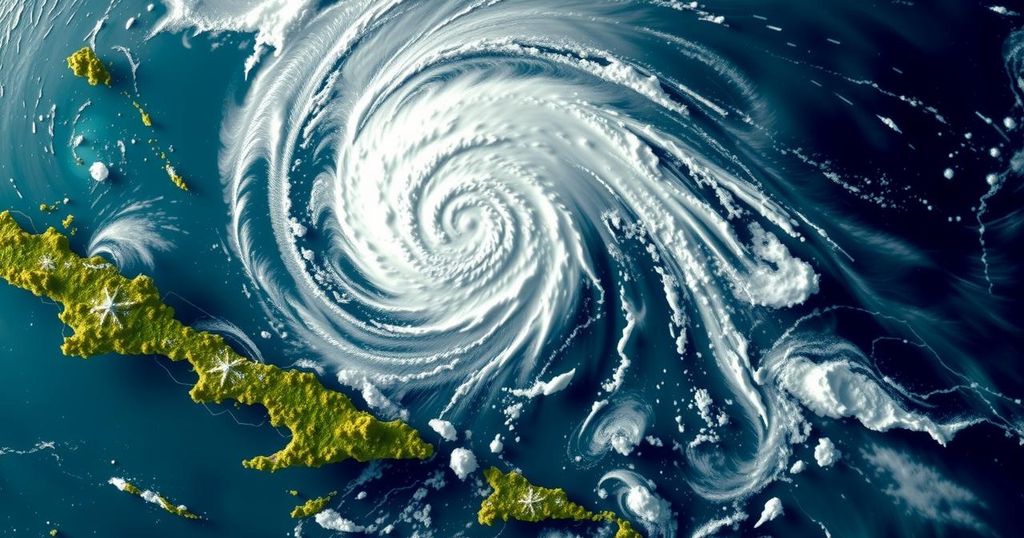Tropical Storm Oscar, after making landfall in Cuba as a Category 1 hurricane and causing at least six fatalities, is moving toward the Bahamas. Currently situated 45 miles from Long Island with winds at 40 mph, the storm is expected to bring substantial rainfall. It is noted for being the smallest recorded hurricane, highlighting the unpredictability of hurricane development amidst an expected active hurricane season.
On Tuesday, Tropical Storm Oscar advanced toward the Bahamas after recently making landfall in Cuba as a Category 1 hurricane. This event tragically resulted in the loss of at least six lives, as the storm yielded significant rainfall on an island already grappling with an extensive power outage. At the time of reporting, Oscar was situated approximately 45 miles (75 kilometers) south-southeast of Long Island in the Bahamas, exhibiting winds of 40 mph (65 kph) and pursuing a north-northeast trajectory at a speed of 12 mph (19 kph), according to the National Hurricane Center based in Miami. The center remarked that “Oscar is at best barely a tropical storm at this time.” Forecasts predicted that the storm could drop as much as 5 inches (13 centimeters) of rain across the southeastern Bahamas, with isolated areas potentially receiving up to 8 inches (20 centimeters). A tropical storm warning was therefore issued for both the central and southeastern regions of the Bahamas. Remarkably, Oscar made history as the smallest recorded hurricane, possessing a wind field extending merely about 6 miles (10 kilometers). Many were taken aback by its strengthening into a hurricane upon impacting Grand Inagua Island in the Bahamas on Saturday, followed by a second landfall in eastern Cuba late Sunday. Hurricane specialist Michael Lowry critiqued the forecasting, stating, “It’s not often we see a colossal failure in hurricane forecasting,” pointing out that the models did not predict Oscar’s development into a hurricane. Within Cuba, Oscar unleashed at least 15 inches (38 centimeters) of rain on parts of eastern regions, sparking concerns over severe flooding and potential landslides, which contributed to the reported fatalities in Guantánamo. The storm coincided with Cuba’s struggles to recover from a major blackout that had ignited a series of small protests, leading the government to issue warnings of punitive measures against any unrest. As the 15th named storm and the 10th hurricane of the current Atlantic hurricane season, which spans from June 1 to November 30, Oscar is indicative of the season’s intensity. The National Oceanic and Atmospheric Administration has predicted an above-average Atlantic hurricane season attributed to record-warm ocean temperatures, estimating between 17 to 25 named storms and foreseeing four to seven major hurricanes classified as Category 3 or higher. Meanwhile, in the Pacific Ocean, Tropical Storm Kristy was observed moving over open waters, situated 375 miles (605 kilometers) west-southwest of Acapulco, Mexico, with sustained winds of 50 mph (85 kph) and a west-northwest movement at 15 mph (24 kph), anticipated to reach hurricane status shortly after the report.
In recent years, weather patterns have shown increasing variability and intensity, contributing to more powerful storms within the Atlantic hurricane season, which runs from June to November. This season, forecasters have anticipated heightened activity due to record-high ocean temperatures which can fuel the development of storms. The situation in the Caribbean, especially in relation to Cuba and the Bahamas, remains critical given existing vulnerabilities, such as infrastructure issues and recent power outages that affect preparedness and response to severe weather events.
Tropical Storm Oscar’s trajectory and impact on Cuba and the Bahamas underscore the unpredictable nature of storms this hurricane season, notably highlighted by its unexpected transition from a tropical storm to a hurricane. With significant rainfall leading to fatalities and ongoing challenges in Cuba from a major power outage, the resilience of these regions is under test. As the Atlantic hurricane season continues, enhanced forecasting and understanding of storm patterns are essential to mitigate future impacts.
Original Source: www.usnews.com






